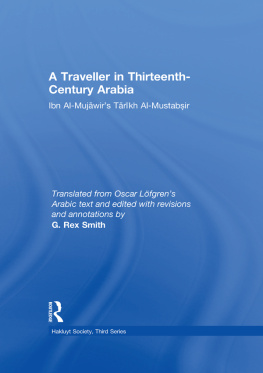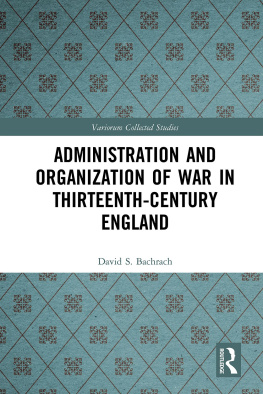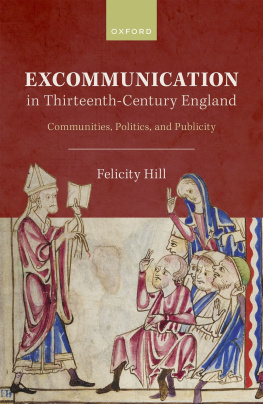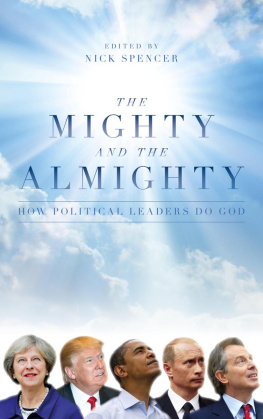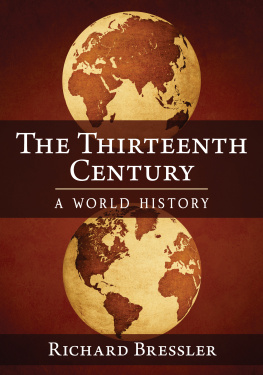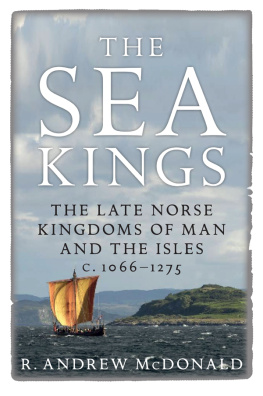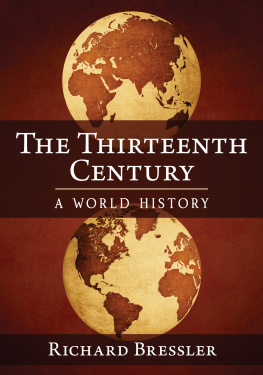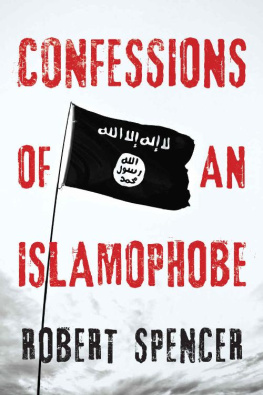Andrew Spencer - Thirteenth Century England XVII
Here you can read online Andrew Spencer - Thirteenth Century England XVII full text of the book (entire story) in english for free. Download pdf and epub, get meaning, cover and reviews about this ebook. year: 2021, publisher: Boydell Press, genre: Politics. Description of the work, (preface) as well as reviews are available. Best literature library LitArk.com created for fans of good reading and offers a wide selection of genres:
Romance novel
Science fiction
Adventure
Detective
Science
History
Home and family
Prose
Art
Politics
Computer
Non-fiction
Religion
Business
Children
Humor
Choose a favorite category and find really read worthwhile books. Enjoy immersion in the world of imagination, feel the emotions of the characters or learn something new for yourself, make an fascinating discovery.

- Book:Thirteenth Century England XVII
- Author:
- Publisher:Boydell Press
- Genre:
- Year:2021
- Rating:3 / 5
- Favourites:Add to favourites
- Your mark:
- 60
- 1
- 2
- 3
- 4
- 5
Thirteenth Century England XVII: summary, description and annotation
We offer to read an annotation, description, summary or preface (depends on what the author of the book "Thirteenth Century England XVII" wrote himself). If you haven't found the necessary information about the book — write in the comments, we will try to find it.
Thirteenth Century England XVII — read online for free the complete book (whole text) full work
Below is the text of the book, divided by pages. System saving the place of the last page read, allows you to conveniently read the book "Thirteenth Century England XVII" online for free, without having to search again every time where you left off. Put a bookmark, and you can go to the page where you finished reading at any time.
Font size:
Interval:
Bookmark:
THIRTEENTH CENTURY ENGLAND XVII
PROCEEDINGS OF THE CAMBRIDGE CONFERENCE, 2017
Edited by
Andrew Spencer
Carl Watkins
THE BOYDELL PRESS
Contributors 2017, 2021
All Rights Reserved. Except as permitted under current legislation
no part of this work may be photocopied, stored in a retrieval system,
published, performed in public, adapted, broadcast,
transmitted, recorded or reproduced in any form or by any means,
without the prior permission of the copyright owner
First published 2021
The Boydell Press, Woodbridge
ISBN 978 1 78327 570 0 hardback
ISBN 978 1 80010 114 2 ePub
ISSN 0269-6967
The Boydell Press is an imprint of Boydell & Brewer Ltd
PO Box 9, Woodbridge, Suffolk IP12 3DF, UK
and of Boydell & Brewer Inc.
668 Mt Hope Avenue, Rochester, NY 146202731, USA
website: www.boydellandbrewer.com
The publisher has no responsibility for the continued existence or accuracy of URLs for external or third-party internet websites referred to in this book, and does not guarantee that any content on such websites is, or will remain, accurate or appropriate
A CIP catalogue record for this book is available from the British Library
Cross references refer to page numbers in the print edition
Cover illustration: The creation of Edward of Caernarfon as Prince of Wales by Edward I, Lincoln Parliament, February 1301. Chronica Roffense, British Library Cotton Nero D ii f.191v
Illustrations and tables
Antonia Shacklock, Henry III and the Native Saints
Figure 1: The House of Savoy 24
Figure 2: Henry III and his family 25
Andrew M. Spencer,A Vineyard Without a Wall: The Savoyards, John de Warenne and the Failure of Henry IIIs personal rule
Table 1: Lay Witnesses to over 100 royal charters between 1236 and 1257
Table 2: Witnessing by earls and Henry IIIs lay foreign relatives, 12361257
Amicie Plissi du Rausas, Ad Partes Transmarinas: The Reconfiguration of Plantagenet Power in Gascony, 12421243
Map 1: Itinerary of King Henry III in Gascony (August 1242September 1243)
Contributors
Rodolphe Billaud, Institut Catholique de Vende
Lars Kjr, New College of the Humanities, London
Philippa Mesiano, University of Kent
Amicie Plissi du Rausas, Universit de Poitiers
Antonia Shacklock, University of Cambridge
Thomas W. Smith, Rugby School
Andrew M. Spencer, University of Cambridge
Rebecca Springer, University of Oxford
Ian Stone, Kings College, London
Anas Waag, University of Lincoln
Abbreviations
Ann. Mon.
Annales Monastici, ed. H.R. Luard, 5 vols. (Rolls Series, 18649)
BL
British Library, London
BN
Bibliothque Nationale, Paris
CChR
Calendar of Charter Rolls, 6 vols. (PRO Texts and Calendars, 190327)
CCR
Calendar of Close Rolls, 43 vols. (PRO Texts and Calendars, 1892 onwards)
CFR
Calendar of Fine Rolls 22 vols. (PRO Texts and Calendars, 191162)
CIM
Calendar of Inquisitions Miscellaneous, 7 vols. (PRO Texts and Calendars, 191668)
CLR
Calendar of Liberate Rolls, 6 vols. (PRO Texts and Calendars, 191664)
Chron. Maj.
Matthew Paris, Chronica Majora, ed. H.R. Luard, 7 vols. (Rolls Series, 187283)
Complete Peerage
G.E. Cokayne, The Complete Peerage of England, Scotland, Ireland, Great Britain and the United Kingdom, ed. V. Gibbs and others, 12 vols. (191059)
CPR
Calendar of Patent Rolls, 59 vols. (PRO Texts and Calendars, 18911966)
CR
Close Rolls of the Reign of Henry III, 14 vols. (PRO Texts and Calendars, 190238)
CRR
Curia Regis Rolls of the Reigns of Richard I, John and Henry III Preserved in the Public Record Office, 17 vols. (PRO Texts and Calendars, 192291)
DBM
Documents of the Baronial Movement of Reform and Rebellion 125867, selected by R.F. Treharne, ed. I.J. Sanders (Oxford: Clarendon Press, 1973)
Dunstable
Annals of Dunstable, Ann. Mon., III, pp. 3408
Foedera
Foedera, Conventiones, Litterae, et Acta Publica, ed. T. Rymer, amended edition by C.A. Clarke and F. Holbrooke, 4 vols. in 7 (Record Commission, 181669)
HA
Matthew Paris, Historia Anglorum, ed. F. Madden, 3 vols. (RS, 18669)
ODNB
Oxford Dictionary of National Biography, ed. H.C. Matthews and C. Harrison, 60 vols. (Oxford University Press, 2004)
PL
Patrologia Latina, ed. J.-P. Migne, 217 vols. (Paris: Hamman, Adalbert G., 184455)
PR
Pipe Rolls, published by the Pipe Roll Society
PRO
Public Record Office
RG
Rles Gascons transcrits et publis, i, ed. F. Michel (Paris: Imprimerie Nationale, 1885).
RLC
Rotuli Litterarum Clausarum in Turri Londinensi Asservati, 2 vols. (183344)
Royal Letters
Royal and Other Historical Letters Illustrative of the Reign of Henry III, 2 vols., ed. W.W. Shirley (Rolls Series, 18626)
Tewkesbury
Annals of Tewkesbury, Ann. Mon., I, pp. 43182
TNA
The National Archives
Waverley
Waverley Annals, Ann. Mon., II, pp. 129412
Winchester
Winchester Annals, Ann. Mon., II, pp. 3128
Worcester
Worcester Annals, Ann. Mon., IV, pp. 355562
Introduction
The seventeenth Thirteenth Century England conference, held at Selwyn College, Cambridge in September 2017, explored England in Europe, and the essays in the present volume, the fruit of the conference, respond to its theme in a variety of ways, ranging over politics, religion and culture. Englands role in the politics of Europe was, of course, profoundly reshaped at the start of the thirteenth century by the disintegration of so much of the Angevin Empire. In hindsight, it is easy to view the reign of John as a watershed, marking the start of a turn towards a more insular focus in politics and society, especially when one thinks of the internal political crises of Henry IIIs reign and Edward Is attempts to subject Wales and Scotland to English rule. These essays complicate, in different ways, such an impression. For while some demonstrate the importance of ongoing political entanglements and memories of past connections, others examine how England was absorbed in trends that operated on a European, or at least a western European, scale. The ambitions and policies of both Henry III and Edward I did not stop at the English Channel, while in the other direction flowed ideas, clerics, ambassadors, refugees, mercenaries and occasionally threats.
Henry III himself looms in a number of the contributions as a king playing on the European stage, even though he was now forced back on Englands resources. Antonia Shacklocks essay shows one way in which the king sought to respond (imaginatively, but with limited eventual success) to his predicament by mobilizing Englands holy men, not only the well-known figure of Edward the Confessor but also a larger communion, including other saintly figures from the Anglo-Saxon past. As Henry looked to insular saints to bolster his standing, he was also importing foreign-born relatives and establishing them in England, and Shacklock shows how he sought to enlist his new men in patriotic devotions. In so doing, the king tried to respond to the problem posed by a baronage whose interests were becoming more Anglocentric and whose instincts put them at odds with the kings policies, including his penchant for introducing aliens to Englands court. Andrew Spencers essay explores the problem of Henrys alien relatives from a different angle, focusing on the role of the Queens continental kinsmen, the Savoyards, and adumbrating a subplot of factionalized court politics. Henry probably conceived of the integration of the Savoyards as a means to re-engineer the upper echelons of political society, and, given the familys transnational network, he also surely saw them as a valuable tool of diplomacy too. But this proved a high-risk strategy in which the risk did not pay off, for although the Savoyards were less disruptive of domestic politics than the next wave of alien entrants, the Lusignans, Spencer suggests ways in which the Queens relations were nonetheless storing up trouble for the king even at an earlier stage of his personal rule. Far from being Henrys instruments, they ended up manipulating the king, further undermining his political credibility in England and further afield.
Next pageFont size:
Interval:
Bookmark:
Similar books «Thirteenth Century England XVII»
Look at similar books to Thirteenth Century England XVII. We have selected literature similar in name and meaning in the hope of providing readers with more options to find new, interesting, not yet read works.
Discussion, reviews of the book Thirteenth Century England XVII and just readers' own opinions. Leave your comments, write what you think about the work, its meaning or the main characters. Specify what exactly you liked and what you didn't like, and why you think so.

